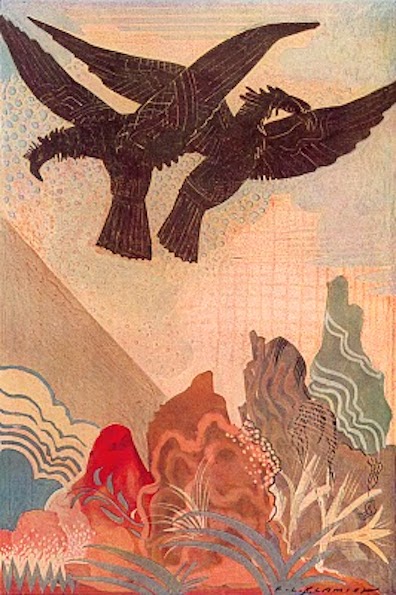In the Catholic Mass, the moment of transubstantiation is
marked by the celebrant raising the Host and a server
ringing a sacring bell. As Mulligan
waits for transubstantiation to occur in his bowl of lather,
he invites the Almighty (the “old chap” of the following
paragraph) to work his magic, and he seems to receive an aural
confirmation corresponding to the peals of the bell: "He
peered sideways up and gave a long low whistle of call, then
paused awhile in rapt attention.... Two strong shrill whistles
answered through the calm." Hearing these miraculous whistles.
a reader may well ask whether Mulligan's mass is something
more than mockery. But there is a realistic explanation.
In "Preparatory to Anything Else: Introduction to Joyce's Hades,"
Journal of Modern Literature 24 (2001): 363-499,
Robert Bell offers a partial explanation of the magic:
Mulligan "expects that at this time every morning he will hear
the whistle of 'the mailboat
clearing the harbor mouth of Kingstown'" (369). If the
mailboat announced its departure from the harbor with a steam
whistle, this would account very well for the "strong shrill"
quality of the blasts. Mulligan knows that he can reliably
predict this aural phenomenon––the mailboats were rigorously
punctual––and he has practiced his summoning of the sound as a
parlor trick to demonstrate his intimate communication with
the divine.
But even timing the anticipated blasts in that way would be
pretty tricky, and in fact there is a way for Mulligan to know
that he is about to hear the whistles. As Stephen Whittaker
and Francis X. Jordan explain in "The Three Whistles and the
Aesthetic of Mediation: Modern Physics and Platonic
Metaphysics in Joyce's Ulysses," JJQ (1995):
27-47, he can time his prediction exactly simply by looking
north (or perhaps gazing in his mirror): "The Martello Tower
upon which Buck performs his trick lies approximately one mile
from the mouth of Kingstown harbor. On the gentle morning of
16 June 1904, one could have clearly seen the steam blasts
from the mailboat's whistle. Albert Abraham Michelson
demonstrated in 1879 that light travels at about 186,000 miles
per second. The light signal would have reached Buck about
five rnillionths of a second after the event, that is,
simultaneously with most of the blast. Sound at sea level
travels at about 1,100 feet per second, so the sound of the
event would arrive at the tower about 4.7 seconds behind the
light.... To anyone observing the events on the parapet, the
effect is an obvious simony, a substitution of scientific
trickery for spiritual power. Only to those of us whose vision
is veiled by the text's temporary exclusion of any sight of
the boat does Buck's power seem either real or mysterious"
(30).
In a book built on symbolic parallels with Homer's Odyssey,
however, the impression of divine intervention may not
entirely dissipate with this knowledge. In book 2, Telemachus
receives an encouraging sign that his father will return to
wreak destruction on the suitors. It takes the form of "two
strong shrill" apparitions:
Then Zeus, whose voice resounds around the world,
sent down two eagles from the mountain peak.
At first they hovered on the breath of wind,
close by each other, balanced on their wings.
Reaching the noisy middle of the road,
they wheeled and whirred and flapped their mighty
wings,
swooping at each man's head with eyes like death,
Then to the right they flew, across the town.
Everyone was astonished at the sight... (147-56)
(trans. Wilson)
If Joyce did mean for his readers to hear an echo of this
passage, then the divine omen is not so encouraging for Mulligan.


